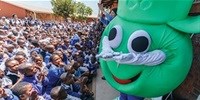In an effort to minimise the number of children who die every day from preventable illnesses such as diarrhoea, Dettol started the energetic industrial theatre road show, Healthy Hands, Healthy Mind, distributed a School Hygiene Workbook and appeared in just under 26,000 schools across the country since 2006.
The on-going school programme has reached 16,020,374 learners and educated them about the importance of good personal hygiene. The show teaches five to ten year-olds how hand washing and good personal hygiene can massively reduce the incidence of infectious disease and illness, while the workbook reinforces the message of the importance of hygiene and keeping healthy.
Dettol's hygiene education initiative is a fun and engaging tool for children, and also provides teachers with resources to support them in reinforcing good hygiene habits to reward learners in keeping their hands clean, along with their parents.
When you consider that diarrhoeal diseases is the second leading cause of death in children under five years old - which is a preventable disease - small hygiene measures like proper hand washing can have a huge impact on children's health and possibly even save their lives.
All learners will share food and drinks, personal space and stationary with no thought to hand washing and it's sometimes not the type of food that learners are eating that causes diarrhoea but rather the dirty hands used to eat the food. Influencing this is the fact that learners spend hours every day together in close proximity at school, whether in the classroom or on the playground. It only takes one child who overlooks good hygiene habits to spread infections to many.
Tips to stay healthy at school
While catching some bugs is inevitable for children there are still ways to reduce the chance that they will get sick. Children should be encouraged to wash their hands with soap and water at specific times:
• Before eating• After going to the toilet
• After playing with a pet/animal
• After coughing, sneezing or blowing their nose
• After touching something dirty (eg chewed pencils, used tissue etc)
• Whenever their hands physically look dirty
• When children starts school, nursery or day care for the first time, look around together and show them where they can wash their hands so they feel familiar with the space



























